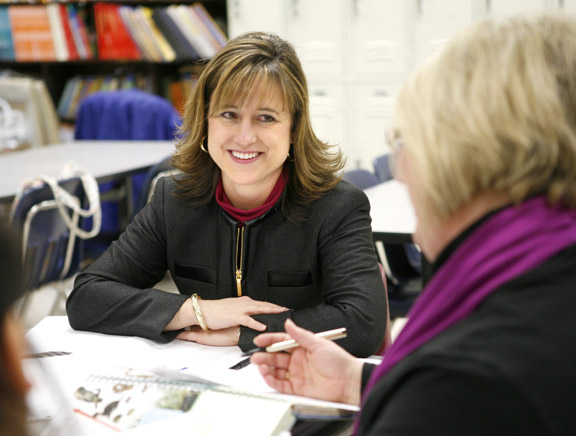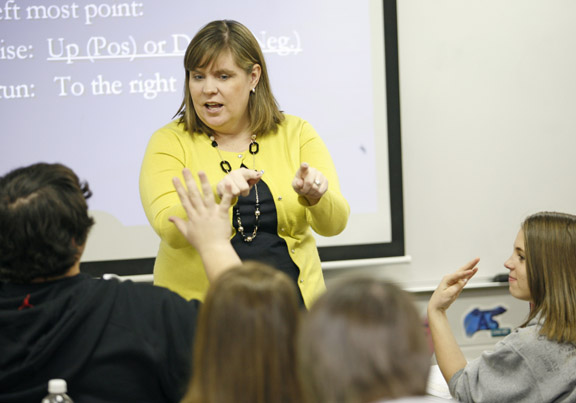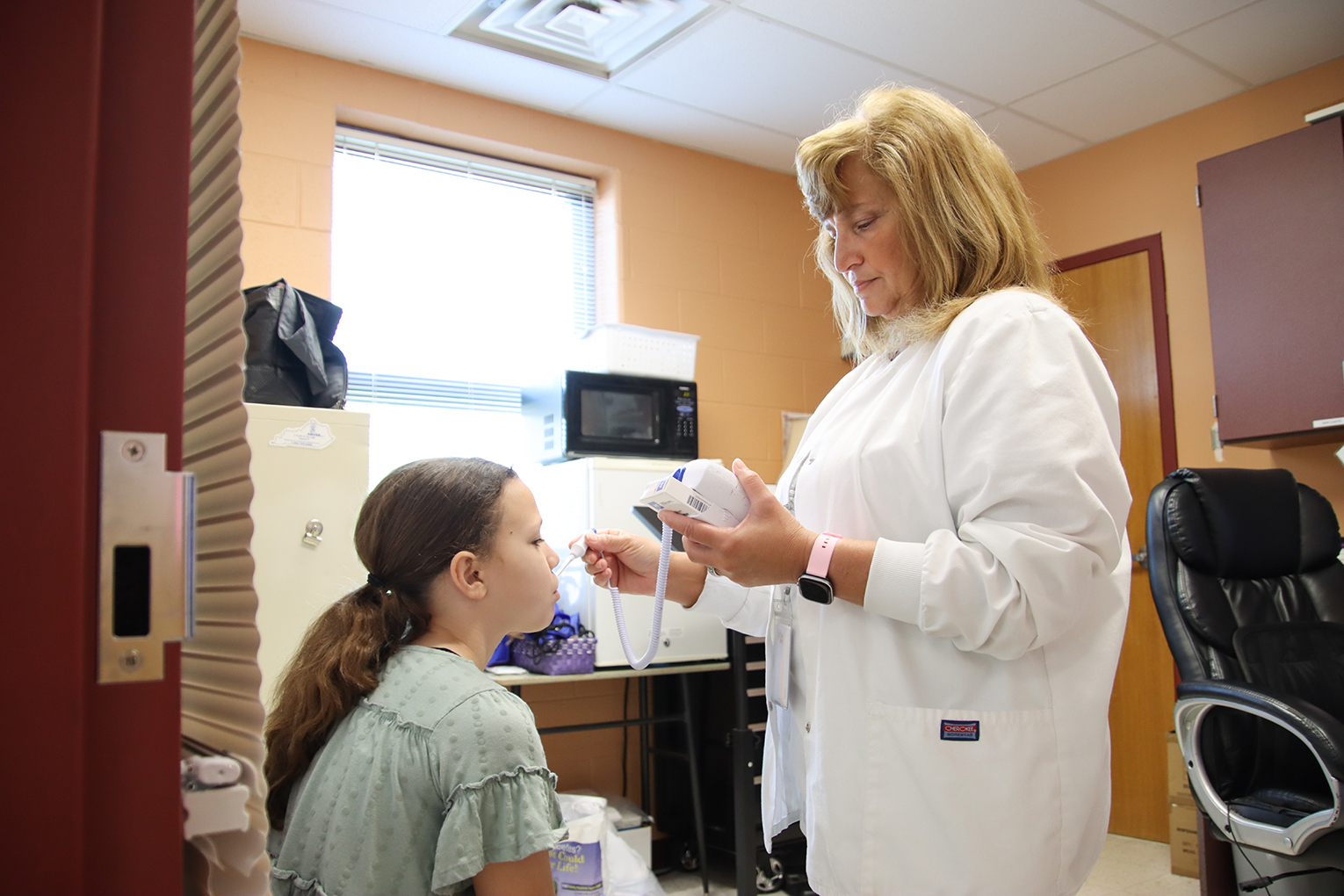
Knox County Director of Districtwide Programs Melissa Evans talks with 6th-grade teacher Kim Duncan during a professional learning community meeting of 5th- and 6th-grade teachers at Jesse D. Lay Elementary School (Knox County) Feb. 8, 2011. Photo by Amy Wallot
By Matthew Tungate
matthew.tungate@education.ky.gov
Melissa Evans and Jenn Crase have all the accolades a teacher could want. Evans is a former Kentucky Middle School Teacher of the Year and Amgen Award for Science Teaching Excellence award winner. Crase is a National Board Certified Teacher who has worked at the local and state levels on standards-based grading.
But each of them independently attributed the power of her heart, not her brain, with her ability to connect with students.
Evans was a teacher at Corbin Middle School (Corbin Independent) for 17 years and is in her first year as director of districtwide programs for the Knox County school district. She said her best assets as a teacher were her “capacity to build relationships with my students and to create a culture where they know I care about them as a person and a student.
“Students knew they were respected and valued, and they felt comfortable in my room. They were not afraid to speak out or answer questions,” Evans said. “They know I truly care about them, and I want to see them succeed.”
Crase, an educator for more than 13 years who has taught 8th-grade mathematics at South Oldham Middle School since 2004, said she would encourage others to teach the children, not the subject.
“I love mathematics very much and try every day to make it interesting and memorable to my students, but what I think they remember – and even what I remember about each of my 14 classes of students – is the special relationships that I have built. I have gotten to know them and what is important in their lives. We have laughed and cried in the classroom, and most of the time it was not about math.”
Because of their devotion to their students, Evans and Crase last year were named as recipients of the prestigious 2009 Presidential Award for Excellence in Mathematics and Science Teaching, Evans in science and Crase in mathematics.

Jenn Crase teaches students how to find the slope between two points during her pre-algebra class at South Oldham Middle School (Oldham County) Feb. 7, 2011. Crase is a recipient of the Presidential Award for Excellence in Mathematics and Science Teaching. Photo by Amy Wallot
Crase said she thinks education in the STEM (science, technology, engineering and mathematics) disciplines is important for students and that people need to stop thinking of them as only for “smart kids.”
She likes when students enter her class at the beginning of the year thinking mathematics is their worst subject and leaving knowing it is important in their everyday lives and that they don’t need to be so scared of it.
Crase, who has a sign in her room that says, “Math Dorks Rock!,” said parents need to make science and mathematics as valued as reading.
“It is important not to give our children the message that ‘I was never really good at math,’ she said. “I doubt many parents flaunt the fact ‘I can’t really read.’ It sends a message to students that it is okay not to be good in these areas, and we need our schools, state and country to be good in the STEM fields.”
With new technology, students need to be trained to be innovative thinkers that use mathematics and science in their everyday lives, Crase said.
“STEM education is where our nation and global society is headed,” she said.
Evans agrees that the STEM disciplines are important because they are the future for students, yet they are undervalued.
“If you asked a young person to name a sports hero or an actor, they could probably name hundreds, but on the other hand if you asked them to name a living scientist today, how many do you think they could come up with?” she asked. “We have got to place more emphasis on the STEM disciplines. Science, technology, engineering and mathematics are crucial to support because students who are STEM graduates will be faced with the daunting task of solving the problems that plague us now, like cancer and climate change. The work of our graduates will improve all of our lives, so we must produce students who are capable of solving these problems and entering the workforce.”
Evans became a teacher to spread that love of exploration – a trait she received from her father. She said her father, who taught science to 5th- and 6th-graders before becoming an elementary school principal was an avid outdoorsman who would take her on “great adventures “like combing rock outcrops to find petrified wood and looking through freshly plowed fields to find artifacts.
“Before ‘hands-on’ was even a buzzword in science education, he was using it in his classroom and to teach me,” Evans said. “He never lost his sense of exploration and was able to spread it to me.”
Her mother also was a teacher and librarian.
Crase’s father would be jealous, since she said she spent her childhood hearing how her father always wished he had become a high school geometry teacher.
“When I went off to college and enrolled in an elementary education program, I felt it was one of the proudest days of my dad’s life,” she said. “I enjoyed learning about education and finding new ways to make it interesting to students. It always felt for me like a job that would never get dull and would never be finished.”
Crase said she also had excellent teachers who challenged her to do well. She grew up near Cleveland, Ohio, and had the same teacher for 2nd, 4th and 5th grades.
“I felt like I grew up with her,” Crase said. “She was always making learning fun, and when I look back, it was never what I learned from her but it was how she treated her students. She truly loved us and wanted the best for each one of us.”
She also had a high school German teacher who influenced her teaching.
“He was a fun-loving teacher who made learning something completely new fun and exciting,” she said.
Evans said some of her past teachers have influenced her so much that they have led to her three keys to education, what she calls the three Es.
The first E is to engage, she said. Engagement comes from developing lessons that are pertinent to the students’ lives to delivering instruction that is individualized to meet the various learning styles, Evans said.
“I would hate to be in a classroom day in and day out where a teacher lectured,” she said. “I am a very kinesthetic and hands-on learner, so if I am not given an opportunity to learn this way, I am missing out.”
Robert Swanson, who taught at Union College, was a major influence on this philosophy, Evans said.
“He also taught this way through a hands-on, minds-on approach,” she said. “He knew students learned by doing and higher-level thinking did not come from regurgitating facts from a text. When you walked into his class, you never knew if you would be wading through a swamp or probing through owl pellets, but you did know you would be doing science and not just reading about it.”
The second E is for explore, just as she learned from her father, Evans said.
“In a science class, exploration should happen daily. Memorizing facts has a small place in education, but it is the ability to ask questions, analyze data and solve problems through experimentation that constitutes real science,” she said. “Therefore, students should be given opportunities to do real science.”
Evans’ last E is evaluation. Students should be encouraged to reflect on their learning, and teachers should reflect on their effectiveness through the students’ performance, she said. Students should be actively involved in reflection by evaluating their progress.
Union College English professor James Garrett showed Evans the significance of this concept during a writing composition class, she said. Garrett made the students do repeated drafts until their work was the best it could be.
“Instead of giving a failing grade, and then moving on, I encourage my students to correct and improve their work, Evans said. “Again, what is the teacher’s job? Is it to teach or to fail students?”
Crase also has a strong interest in evaluations, though in her case they are standards-based.
She said she attended a professional development (PD) session in 2005 that made her rethink how she had been assessing student work. Now, instead of teaching a unit on geometric concepts and then giving students one big test at the end of the unit, she breaks her assessments into five or six categories and sees what students know on each of them.
“I have worked over the past five years on helping students become aware of what they know and what they don’t know instead of just assigning a number grade to their learning,” Crase said.
Just as Crase’s revelation came from a PD, Evans too stresses the importance of teachers working on their craft.
“I would also encourage young teachers to take advantage of any professional development opportunity that you can,” she said. “I have gained so many ideas and activities that have improved my teaching through professional development. I also would recommend that you actively seek out professional development in the areas you feel are your weaknesses.”
One such PD opportunity led her to Egypt.
“I applied with a colleague who teaches math, and we decided to write an interdisciplinary unit on ancient Egypt,” Evans said. “We had to identify an opportunity that would have the greatest impact on our practice, the academic lives of our students and on our school communities.
“This was a life-changing experience for me. I did have reservations about traveling to Egypt, but I knew I needed to step out of my comfort zone in order to grow.”
MORE INFO…
Presidential Awards for Excellence in Mathematics and Science Teaching
Jenn Crase, jennifer.crase@oldham.kyschools.us, (502) 241-0320, ext. 128
Melissa Evans, melissa.evans@knox.kyschools.us, (606) 546-3157, ext. 2028










We would all do well to follow the guidelines expressed by these teachers. Far too often we, as educators, fail to recognize the student above the content. By the same token, educators should also be recognized above the content. Sometimes teachers-as-people are given less consideration than they deserve, too.